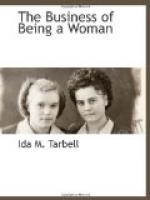Martha Berry tells of an illuminating experience in her school of Southern mountain girls. She had taken great pains to teach them correct standards and principles of dress. She had been careful to see that simplicity and quality and fitness were all that they saw in the dress of their teachers. Then one day they had visitors, fashionable visitors, in hobble skirts and strange hats and jingling with many ornaments. They were good and interesting women, and they talked sympathetically and well to the girls. Miss Berry was crushed. “What will the girls think of my teachings?” she asked herself. “They will believe I do not know.” But that night one of her assistants said to her: “I have just overheard the girls discussing our visitors. They liked them so much, but they are saying that it is such a pity that they could not have had you to teach them how to dress.”
As a method of education, instruction in the principles of dress is admirable for a girl. Through it she can be made to grasp the truth which women so generally suspect to-day; that is, the importance of the common and universal things of life; the fact that all these everyday processes are the expressions of the great underlying truths of life. A girl can be taught, too, through this matter of dress, as directly perhaps as through anything that concerns her, the importance of studying human follies! Follies grow out of powerful human instincts, ineradicable elements of human nature. They would not exist if there were not at the bottom of them some impulse of nature, right and beautiful and essential. The folly of woman’s dress lies not in her instinct to make herself beautiful, it lies in her ignorance of the principles of beauty, of the intimate and essential connection between utility and beauty. It lies in the pitiful assumption that she can achieve her end by imitation, that she can be the thing she envies if she look like that thing.
The matter of dress is the more important, because bound up with it is a whole grist of social and economic problems. It is part and parcel of the problem of the cost of living, of woman’s wages, of wasteful industries, of the social evil itself. It is a woman’s most direct weapon against industrial abuses, her all-powerful weapon as a consumer. At the time of the Lawrence strike, Miss Vida Scudder, of Wellesley College, is reported to have said in a talk to a group of women citizens in Lawrence:—
“I speak for thousands besides myself when I say that I would rather never again wear a thread of woolen than know my garments had been woven at the cost of such misery as I have seen and known, past the shadow of a doubt, to have existed in this town.”
Miss Scudder might have been more emphatic and still have been entirely within the limit of plain obligation; she might have said, “I will never again wear a thread of woolen woven at the cost of such misery as exists in this town.” Women will not be doing their duty, as citizens in this country, until they recognize fully the obligations laid upon them by their control of consumption.




